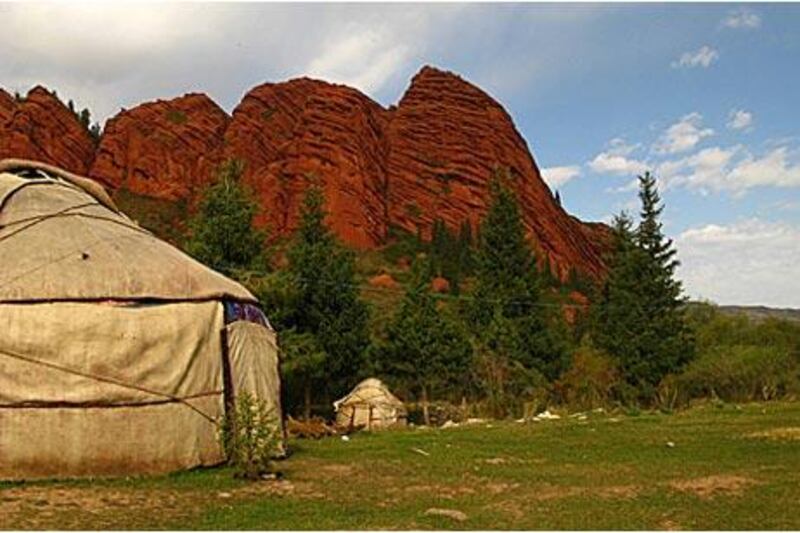Dawn has followed me to Kyrgyzstan, and in the golden light I see a grey old-model Audi pull over on the side of the road in the capital, Bishkek. I squint to see who's behind the wheel. I had arranged with the taxi driver who took me from the airport to ride in this car - driven, he told me, by his brother-in-law - six hours away to the outpost of Karakol. But I'm still not sure whether or not he's trying to rip me off. As I cross the tarmac I can make out that there's a man and a woman inside. Stuffed animals dangle from the rear-view mirror. It looks safe - finally, after two nights in a row aboard planes, I'll be able to sleep.
As we motor away the plump woman speaks to me in Russian, my confused look in no way weakening her persistence in this regard. Winding around mountain turns, my only successful form of communication is with the balding driver with deep lines sunken into his face: when he cracks his window and smokes a cigarette I do the same and we roll up the glass all at once. At some point, I pass out. When I awaken the door is open and there's someone new hovering over me. A red hood covers her head, black strands of hair are escaping and framing a pretty face and a lollipop is poking from her mouth. She looks about 20.
If this is a dream, I decide, at least she will speak English. "Hello," she smiles. Her name is Aipery. She's the couple's daughter and she works in this small town on the way to Karakol. Can she be my guide, she asks? Still half-asleep, I explain I want to go to the mountains and spend the night in a yurt. What will that cost? The young woman begins scribbling on a notepad an itinerary for which everything has a price. For example, when she writes the cost for bed and breakfast I say I don't eat in the morning, only tea. She scratches out 400 som for "breakfast" and writes "tea" next to 50 som. After filling several pages we come to a grand total of US$280 (Dh1,030), which is less than what my guidebook advises for similar three-day trips. There is the added appeal that I have bypassed any tourist agencies, which is always a goal.
The next morning Aipery and her father collect me from my Karakol hotel and we drive off into the mountains through little villages where chickens peck the road. When I see on my right a scene of a couple of yurts backgrounded by a red-faced cliff, a stream and white mountains, I ask the driver to stop for a snapshot. I get out of the car and adjust the settings on my point-and-click camera to try to capture more beauty than it can hold. Aipery and her father enter the yurt. This is our destination, I discover to my delight. The woman in the yurt is Aipery's aunt.
The setting and the lunch of plov, fresh-baked bread and raw honey are perfect. But money and communication are becoming problematic - much as the warnings I had received about Kyrgyzstan predicted. Aipery often confuses simple words like "who" and "what", "house" and "horse". When I wander outside in the morning to go to the loo and step barefoot on a bee, I realise I have no way to convey that I may be allergic. The beekeeper standing nearby, however, seems to know just what to do. "Vodka!" he yells through cupped hands. Aipery runs over with a shot glass and a zakuska of a tomato slice bearing a sprig of dill.
As far as money is concerned, even though every bit of our itinerary was painstakingly itemised, the costs keep changing. My food, for example, is meant to be 400 som. But Aipery informs me it will be twice that because she had lunch, too. I ask if every meal will cost double. "I no eat?" She replies, doe-eyed. After spending the night in the yurt with Aipery and her aunt sharing a mat two metres away, her father picks us up.
We round the shores of Lake Issykol and then ascend along rubble roads. Again, where we arrive is more ideal than I could imagine. In a boulder-strewn valley sits a weatherworn horse ranch. There is a tiny cottage -Aipery's grandmother's - with sheep's felt cladding the door and smoke billowing from a chimney. Bloody meat is piled on the table inside. A tiny stove burns patties of cow dung. In the corner of the kitchen there is a bed where, beneath a pile of blankets and clothes, lies a frail woman who looks older than the mountains. In her blotchy hand she clenches a tin can, every so often heaving and expectorating into it.
The other women of the house roll out sheets of dough and fold fatty chunks of mutton, onions and spices into manti. Dinner is followed by endless rounds of green tea drunken from little bowls - to finish one is to ask for another - and more strange sounds coming from deep inside grandma. Aipery finds in another room an aged overcoat lined with snow leopard's fur. She dresses her father in it and one of the white felt hats that old Kyrgys men wear and asks me to take a portrait.
The experience of the last few days has been raw and difficult sometimes, but I know it's not one offered by any travel agency. I realised a while ago that I financed a trip for Aipery's parents to visit their daughter and family. In a way, everyone got what they wanted, plus a little bit more. lkummer@thenational.ae





